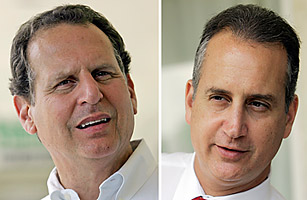
South Florida U.S. Reps. Lincoln, left, and Mario Diaz-Balart.
It's a wonder the television crime series CSI Miami hasn't used the battle for Florida's 21st congressional district as fodder for an episode. Few Miamians can recall election advertising more vicious, dishonest or vacuous than the grainy manipulation of facts and images put out by U.S. Representative Lincoln Diaz-Balart and his Democratic challenger, Raul Martinez.
Diaz-Balart, the panicked eight-term incumbent, got the negative attack sludge flying with spots that leave the impression that Martinez is a drug mafioso—just because he's briefly pictured as a local political boss in a 2006 documentary on Miami's cocaine cowboys. Martinez has responded by depicting Diaz-Balart being led away in handcuffs in 1995 because, the viewer is misled to believe, he took illegal cash—when in fact he was arrested for protesting outside the White House against President Clinton's Cuba policy. "As a Cuban-American, I thought this kind of ugly machismo had passed in our community," says Rafael Lima, a University of Miami communications professor. "The prospect of either one of these guys winning has begun to scare people here."
It's a sad denouement to what was supposed to be a watershed civic exercise for the Magic City. The close Diaz-Balart/Martinez contest—and the equally tight race in the adjoining 25th district between Diaz-Balart's GOP incumbent brother, U.S. Representative Mario Diaz-Balart, and Democratic challenger Joe Garcia—are two of this year's most hotly contested elections.
In large part, that's because they're testing one of the more enduring assumptions of U.S. politics. Since the Reagan era, Beltway Republicans have believed that as long as they presented their congressional candidates in Miami as Fidel Castro-hating freedom lovers, and painted opponents as Fidel Castro-loving freedom haters, the city would be their political beach resort. And until now they have been proven right: the Diaz-Balarts, as well as 10-term GOP incumbent U.S. Representative Ileana Ros-Lehtinen, of the 18th district, have usually run unopposed. Meanwhile, Miami's hardline Cuban exiles became the most important voters in the nation's largest swing state; and catering to them has been rule numero uno for both parties.
But the Republicans failed to grasp Miami's changing demographics, including growing numbers of younger, more moderate Cuban-Americans and non-Cuban Latinos. Those voters care about issues besides Cuba, especially now as Florida confronts one of the nation's worst home foreclosure rates and the middle class struggles with Miami's low-wage economy. Since 2006, new voter registration is up 21% for Democrats in the 21st district, but only 2.5% for Republicans; it has lept 24% for Democrats in the 25th district versus 6% for the GOP. Just as important, independent voter registration has expanded 16% in the 21st and 18% in the 25th. As a result, Miami's three Cuban-American GOP incumbents are facing unusual competition, and the Diaz-Balart dynasty is under siege. If just one of the brothers loses on November 4, pundits suggest, it could alter the way both parties approach Florida. That in turn could even potentially lead to a revision of Cuba policy and the 46-year-old U.S. trade embargo against the communist island.
(See a video about Young Cuban American Voters here.